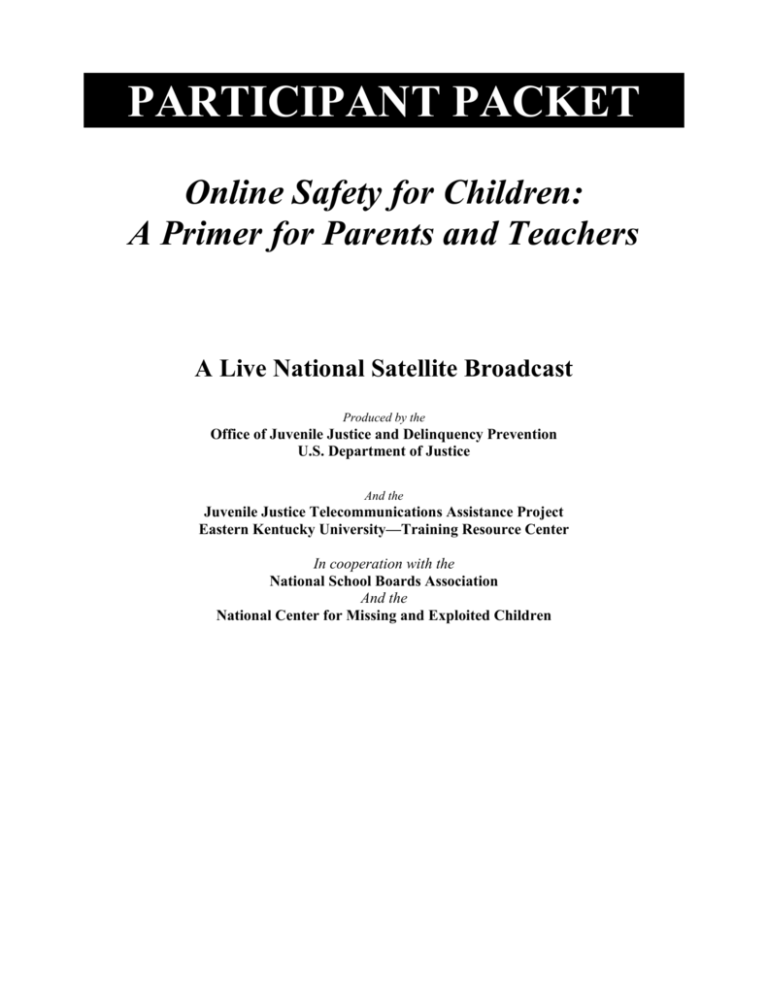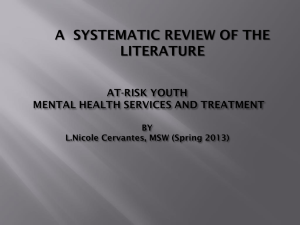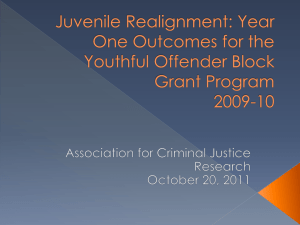as a word document
advertisement

PARTICIPANT PACKET Online Safety for Children: A Primer for Parents and Teachers A Live National Satellite Broadcast Produced by the Office of Juvenile Justice and Delinquency Prevention U.S. Department of Justice And the Juvenile Justice Telecommunications Assistance Project Eastern Kentucky University—Training Resource Center In cooperation with the National School Boards Association And the National Center for Missing and Exploited Children Online Safety for Children: A Primer for Parents and Teachers Live Broadcast #1 6:30-8:00 PM EST 5:30-7:00 PM CST Live Broadcast #2 6:30-8:00 PM MST 5:30-7:00 PM PST 2 Online Safety for Children: A Primer for Parents and Teachers Introduction The Internet offers unprecedented opportunities to learn about the world around us. It is both an educational and recreational resource allowing its users to learn about an array of topics, play games and communicate with friends and family members. It is estimated that by the year 2002, 45 million children will use the Internet. Even those people who do not have computers in their home can access online services in the workplace, public library or school. Most users have a positive experience while online. Although the positive aspects of the Internet most often far outweigh the negatives, it is important to understand its inherent dangers. Some individuals use the Internet to identify children susceptible to exploitation. Cloaked in the anonymity of the Internet, these individuals enter chat rooms seeking adolescents who appear to alienated and unhappy. Offering sympathy and understanding, these offenders can quickly become the new best friends of a lonely child. Unfortunately, the new best friend is only interested in manipulation and exploitation. Children are naturally inquisitive, trusting, and anxious to learn about the world around them, and this makes them easy targets. Teenagers’ curiosity about sexual matters make them more likely to go online to look for sexually explicit material. They are particularly at risk because they often use the computer unsupervised and are more likely than younger children to participate in online discussions regarding relationships or sexual activities. Risks Involved In Internet Use The National Center for Missing and Exploited Children, in its brochure titled Child Safety on the Information Highway, identifies risks associated with Internet use including: 1. Children may be exposed to inappropriate material of a sexual or violent nature. 2. While online, a child might provide information or arrange an encounter that could risk his or her safety or the safety of other family members. In a few cases, pedophiles have used online services and bulletin boards to gain a child’s confidence and then arrange a face-to-face meeting. 3. A child might encounter E-mail or bulletin board messages that are harassing, demeaning, or belligerent. While the number of reported incidents of harm being done to children as a result of online use remains fairly low, the results can be devastating when exploitation occurs. It is likely that many cases go unreported, as teenagers are reluctant to discuss their experiences with adults. 3 In addition to child exploitation, other potential areas of criminal behavior related to Internet use include theft of information, aggravated harassment, schemes to defraud, forgery, and cyberstalking. The purpose of this videoconference is to make parents, educators, administrators and others aware of the potential dangers of the Internet and recommend strategies to protect children who use it. By being aware of the dangers and knowing how to avoid them, children can take full advantage of all the Internet has to offer without taking risks. The videoconference will also include a discussion of how far institutions should go in protecting children by balancing the harm that can be done with equal concern for free speech. Steps Which Adults Can Take To Minimize Dangers There are steps which adults can take to reduce the possibility of a child being victimized over the Internet. Many of these steps will be discussed by the panelists during the videoconference. Some recommendations can be implemented in both schools and homes while others may be more applicable to one or the other. Adults will need to decide the appropriateness of the recommendations to their individual circumstances. The basic principles, however, include the following: 1. Maintain open communication with children and encourage them to talk with you about anything that makes them feel uncomfortable; 2. Spend time with children while they are online including having them show you their favorite on-line destinations; 3. Familiarize yourself with the filtering programs and browsers available through your provider; 4. Place computers in areas that can be easily supervised; 5. Set guidelines and rules for children to follow while online. 6. Educate children about the dangers of the Internet; instruct them not to: give out identifying information such as their name, home address, school name, or telephone number; arrange to meet someone face-to-face that they have met online; download pictures from an unfamiliar source; call someone whose number was provided over the Internet as caller ID allows the child’s number to be identified; respond to messages that are inappropriate, sexually explicit, or harassing; upload (post) pictures of themselves to those they do not personally know; and assume that whatever they read online is true; for example, a person claiming to be a young girl may actually be an adult male. 4 Operation Blue Ridge Thunder Program Overview Operation Blue Ridge Thunder, a program within the Bedford County Sheriff’s Office, has been successful in implementing initiatives to combat child pornography and other crimes against children over the Internet. The program, also, has established an educational initiative for children. The Bedford County Sheriff’s Office has earned national praise and recognition for taking a front line position in the battle against those who use the Internet to exploit children. With the full cooperation and assistance of the Bedford County Commonwealth’s Attorney, Randy C. Krantz, Sheriff Mike Brown has assembled a Task Force dedicated to tracking and arresting those who create, market and distribute child pornography as well as those who solicit minors for illicit purposes. The program began in February, 1998, with Sgt. Sergio Kopelev initially working the Internet 12 hours a week. Operation Blue Ridge Thunder has grown to include a supervisor, two full time investigators, an analyst and a capable, comprehensive Task Force who blend their talents and resources to fight child exploitation on the Internet. Operation Blue Ridge Thunder received a $200,000 grant in 1998 from the Office of Juvenile Justice and Delinquency Prevention of the U.S Department of Justice. The grant was part of a $2.4 million “Internet Crimes Against Children” funding and Operation Blue Ridge Thunder was the smallest agency to receive a grant. The money is used to educate parents and children about Internet safety as well as to expand training in Internet policing for other police agencies in Virginia. Operation Blue Ridge Thunder’s educational campaign, “Safe Surfin,” seeks to raise awareness of Internet safety issues among school age children. Program staff visit schools and use cartoon mascots and other “cool stuff” to insure a receptive audience. Staff created two characters; one is “Rudy, the Reckless Surfer” who uses fun, easy to remember steps to teach kids the rules of safe surfing, sometimes through his own mistakes. The second character, “Serge, the Protector” is Rudy’s friend and often keeps Rudy out of some potential Internet pitfalls. Together, the cartoon characters make Internet savvy and safety an exciting and fun topic for kids of all ages. “Safe Surfin” includes video and PowerPoint presentations addressing real “chat room” situations. Staff recognizing that student involvement is the key to children learning and remembering new topics. In specially designed skits, children pretend they are in chat rooms and gain some real life experience about what they may encounter. The program also provides materials for children to take home including coloring books, mouse pads, T-shirts and stickers which contain Internet safety tips. The purpose of the material is to encourage discussion of Internet safety among children, their parents and teachers. A minor league baseball team, the Salem Avalanche, has joined forces with Blue Ridge Thunder to promote the “Safe Surfin” program. The annual highlight of this effort is a “Safe Surfin Day” at the ballpark and admission is free for all students in the region. 5 The campaign will be presented to 135 School Superintendents from across the mid-Atlantic region and later launched in schools throughout the county and the Commonwealth of Virginia. Bedford county is also developing a specially designed curriculum for churches and civic groups to use in a class or group setting. Operation Blue Ridge Thunder www.blueridgethunder.com or Internet Crimes Against Children Task Force Bedford County Sheriff’s Office 1345 Falling Creek Road Bedford, VA 24523 PH: 877-216-4800 Fax: 540-586-9100 6 Online Safety Resources 1) A Parent’s Guide to Internet Safety Available at: www.fbi.gov/library/pguide/pguide/htm and Safety Tips for Kids on the Internet www.fbi.gov/kids/crimepre/internet/internet.htm or Federal Bureau of Investigation Office of Crimes Against Children 935 Pennsylvania Avenue, NW, Room 4127 Washington, DC 20535 Ph: 202-324-3666 or 1-800-843-5678 2) Site Seeing on the Internet Available at www.ftc.gov/bcp/conline/pubs/online/sitesee/index.html or Federal Trade Commission CRC-240 Washington, DC 20580 1-877-FTC-HELP (382-4357) 3) CyberTipline and the Internet Safety Quiz for Kids Available at: www.missingkids.com/cybertip or National Center for Missing & Exploited Children Charles B. Wang International Children's Building 699 Prince Street Alexandria, Virginia 22314-3175 PH: 703-274-3900 FAX 703-274-2220 24-hour Hotline 1-800-THE-LOST (1-800-843-5678) 4) Operation Blue Ridge Thunder www.blueridgethunder.com or Internet Crimes Against Children Task Force Bedford County Sheriff’s Office 1345 Falling Creek Road Bedford, VA 24523 PH: 877-216-4800 Fax: 540-586-9100 5) The Librarian’s Guide to Cyberspace for Parents and Kids 7 www.ala.org/parentspage/greatsites/guide.html or American Library Association 50 E. Huron Chicago, IL 60611 1-800-545-2433 Email: webmaster@ala.org 6) Internet Guides, Tutorials and Training www.loc.gov/global/internet/training.html or Library of Congress 101 Independence Ave, SE Washington, DC 20540 202-707-5000 Email: Icweb@loc.gov 7) Parents Guide to the Internet www.ed.gov/pubs/parents/internet.html or U.S. Department of Education 400 Maryland Ave, SW Washington, DC 20202-0498 PH: 1-800-USA-LEARN Email: CustomerService@inet.ed.gov 8) Leadership and Technology: What School Board Members Need to Know www.nsba.org/leadtech.html $28.00 per copy, Order #03-135-EKU or National School Boards Association 1680 Duke Street Alexandria, VA 22314 PH: 1-800-706-6722 Fax: 301-604-0158 Email: info@nsba.org 9) Parental Information Websites www.getnetwise.org www.safekids.com www.safeteens.com www.cyberangel.org www.safesurfin.com Resource Organizations 8 Federal Bureau of Investigation (FBI) Innocent Images Initiative Baltimore Division 11700 Beltsville Drive Calverton, MD 20705 PH: 301-586-4519 (8:00 am to 4:00 pm) PH: 301-586-4500 (4:00 pm to 12:00 am) www.fbi.gov/fo/balt/mainfr.htm National Center for Prosecution of Child Abuse American Prosecutors Research Initiative (APRI) 99 Canal Center Plaza, Suite 510 Alexandria, VA 22314 PH: 703-739-0321 www.ndaa-apri.org U.S. Customs Service Cyber Smuggling Center 11320 Random Hills Road, Suite 400 Fairfax, VA 22030 PH: 703-293-8005 www.customs.ustreas.gov/ U.S. Postal Inspection Service 475 L’Enfant Plaza West SW Washington, DC 20260 PH: 202-268-4286 www.usps.gov:80/postalinspectors/ National Center for Missing & Exploited Children Charles B. Wang International Children's Building 699 Prince Street Alexandria, Virginia 22314-3175 PH: 703-274-3900 FAX 703-274-2220 24-hour Hotline 1-800-THE-LOST (1-800-843-5678) www.missingkids.com/cybertip Online Safety for Children: A Primer for Parents and Teachers 9 Program Panelists Ernie Allen, President and CEO National Center for Missing and Exploited Children, Charles B. Wang International Children’s Building, 699 Prince Street, Alexandria, Va. 22314-3175; PH: 703-274-3900; Fax 703-2742222. Mr. Allen was co-founder of the private nonprofit Center which has helped recover over 48,000 children, while increasing its recovery rate from 62% in 1990 to 93% today. Called one of America’s leading “social entrepreneurs,” Allen has brought technology and innovation to the Center, including computerized age progressions of long-term missing children, an award winning Internet website that handles 3 million “hits” per day; a CyberTipline called “the 911 for the Internet” and a new International Centre to expand services worldwide. He is an active spokesman for the cause, having made numerous appearances on Oprah, The Today Show, Good Morning America, and Larry King Live. He is an alumnus of the Louis D. Brandeis School of Law and the University of Louisville and a member of the Kentucky Bar. Shay Bilchik, Administrator Office of Juvenile Justice and Delinquency Prevention, Office of Justice Programs, U.S. Department of Justice, 800 K Street NW, North Entrance, Washington, D.C. 20001; PH: 202307-5911; Fax: 202-514-6382. Mr. Bilchik was confirmed by the United States Senate as Administrator of the Office of Juvenile Justice and Delinquency Prevention in 1994. Prior to that time, he served as Associate Deputy Attorney General. Mr. Bilchik’s career began in the State of Florida where he worked 17 years as a prosecutor. He served as a Chief Assistant State Attorney and as the coordinator of many special programs, including all juvenile operations as the Police-Juvenile Prosecutor Liaison and the School-Juvenile Prosecutor Liaison. Michael J. Brown, Sheriff Bedford County Sheriff’s Office, Operation Blue Ridge Thunder, Internet Crimes Against Children Task Force, 1345 Falling Creek Rd., Bedford, Va. 24523; PH: 540-586-4800; Fax: 540586-9100. Sheriff Brown has been Sheriff of Bedford County, Virginia, since 1996, and is a retired federal agent having served in the criminal justice field on local, national, and international levels since 1966. Prior to being elected to his current office in 1996, Brown was a consultant, instructor, and program developer for the U.S. Department of Justice, International Criminal Investigation Training and Assistance Program in Central and South America and the Caribbean. He has also performed consulting assignments for the Central Intelligence Agency, the Department of Defense and Fortune 500 companies. Sheriff Brown is a graduate of the American University, Washington, D.C. 10 Anne Bryant, Ed.D, Executive Director National School Boards Association, 1680 Duke St., Alexandria, Va. 22314-3407; PH: 703-8386722; Fax 703-683-7590. Dr. Bryant heads a federation of state and territorial organizations dedicated to advancing education through citizen governance of public schools. The federation reaches 15,500 school districts involving 95,000 school board members. Dr. Bryant is an advisory commissioner of the Education Commission of the States and a member of the CEO Forum of Education and Technology, an organization of 20+ high technology CEO’s assembled to report to the nation on progress in technology and education. She holds an Ed.D. degree from the University of Massachusetts and a B.A. from Simmons College. Mindy Shannon Phelps, Moderator Ms. Phelps has moderated numerous national satellite videoconferences produced by OJJDP. Her professional experience includes serving as a co-anchor of WLEX-TV’s evening news. WLEX is an NBC affiliate located in Lexington, Kentucky. Ms. Phelps has served as Press Secretary for the Governor’s Office in the Commonwealth of Kentucky and currently acts as the statewide coordinator of Habitat for Humanity. 11 Previous Satellite Videoconferences Produced by the Office of Juvenile Justice and Delinquency Prevention Conditions of Confinement in Juvenile Corrections and Detention Facilities September 1993 Community Collaboration June 1995 Effective Programs for Serious, Violent, and Chronic Juvenile Offenders October 1995 Youth-Oriented Community Policing December 1995 Juvenile Boot Camps February 1996 Conflict Resolution for Youth May 1996 Reducing Youth Gun Violence August 1996 Youth Out of the Education Mainstream October 1996 Has the Juvenile Court Outlived Its Usefulness? December 1996 Youth Gangs in America March 1997 Preventing Drug Abuse Among Youth June 1997 Mentoring for Youth in Schools and Communities September 1997 Juvenile Offenders and Drug Treatment: Promising Approaches December 1997 Comprehensive Juvenile Justice in State Legislatures February 1998 Protecting Children Online March 1998 Youth Courts: A National Movement May 1998 Risk Factors and Successful Interventions for Serious and Violent Juvenile Offenders September 1998 White House Conference on School Safety: Causes and Prevention of Youth Violence October 1998 Juveniles and the Criminal Justice System December 1998 Females and the Juvenile Justice System May 1999 Promising Practices for Safe and Effective Schools September 1999 For Further Information For videos of previous OJJDP videoconferences, please contact the Juvenile Justice Clearinghouse, PO Box 6000, Rockville, MD 20849-6000; call 800-638-8736; fax 301-251-5212; or e-mail askncjrs@ncjrs.org. For information on future OJJDP programs, contact Becky Ritchey, Juvenile Justice Telecommunications Assistance Project, Eastern Kentucky University, 301 Perkins Building, 521 Lancaster Avenue, Richmond, KY 40475-3102; call 606-622-6671; fax 606-622-4397; or e-mail ekujjtap@aol.com 12


